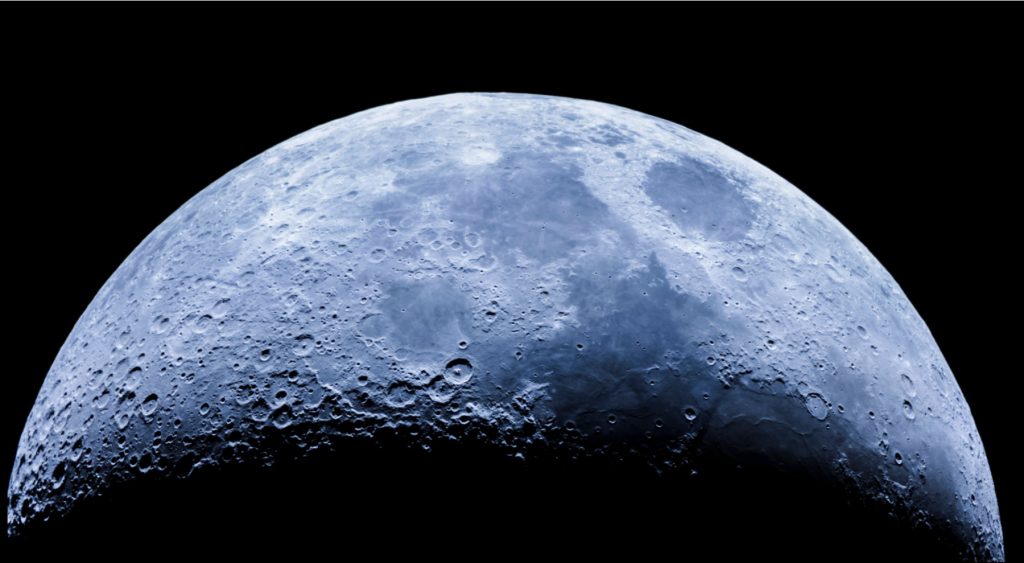
For hundreds of years, it’s been a kind of running joke:
The moon is made of green cheese.
“Green” in this context means not-yet-fully-aged, as opposed to spectacular fungal growth. It’s easy to understand how medieval observers, gazing at the brightest object in the night sky, were reminded of a wheel of cheese. Besides, no one would ever be able to prove it wasn’t so. It’s not as if human beings would ever walk on the surface of the moon.
But then we did. Six times.
And now we know that the moon is a potential treasure chest of resources that just might transform life on earth in the 21st century.
The lunar surface gives the impression of being an endless expanse of gray dust. Apollo 11 astronaut Buzz Aldrin described it as a “magnificent desolation.” But scientists have learned that the lunar soil is generously laced with aluminum, silicon, magnesium, and other elements – including uranium, thorium, and the “rare earth” minerals that are critical for the production of our cell phones, computer monitors, rechargeable batteries, and LED technology.
One of the key factors fueling China’s high tech revolution is that 96% of the earth’s known deposits of rare earth substances have been found within China’s borders. It’s no surprise that Chinese officials have been reluctant to share them. One of the primary goals of the space programs of the United States, Russia, Europe, Japan and India is to reach the moon and begin mining these priceless resources.
But that’s not the real prize.
The moon is a repository of helium-3, a light, stable, non-radioactive isotope of helium that is valued at approximately a million dollars an ounce. While comparatively rare on earth, it is abundant in the lunar soil. According to Leonard David in Moon Rush: The New Space Race, helium-3 can be harvested and converted into a clean form of energy. If even a modest portion of the 1.1 million metric tons believed to be on the moon’s surface could be transported here to earth, it would solve our planet’s energy needs for more than 10,000 years.
Then there’s solar energy.
Because the moon has no atmosphere, its surface receives 600 times more energy from the sun than reaches the earth. For more than 20 years engineers have been envisioning ways to construct a belt of solar cells around the moon. Collected solar energy could be sent via microwave beams to the earth, where it would be converted into electrical energy. Again, the sudden possibility of easing humanity’s dependence on fossil fuels seems almost miraculous.
The moon is a treasure. We just didn’t know it.
Who could have imagined that the earth’s only natural satellite might turn out to be more than just the regulator of oceanic tides and a beautiful backdrop for romantic evenings?
It’s an old story: That which is overlooked comes to the rescue.
That’s also a central part of the Bible’s story.
An obscure group called the Hebrews – a dozen powerless tribes squeezed between Babylon, Assyria and Egypt, the so-called real powers of the ancient Near East – becomes the means by which God blesses the whole world. David – the eighth boy in a family of eight boys, dismissed by his own father as the haqqaton or “runt of the litter” – becomes not only the king of Israel but the prototype for the future Messiah.
Jesus himself – who is called Immanuel or “God With Us” – arrives not as a thunderbolt-hurling version of Zeus but as a blue collar worker written off by the Powers That Be. “The stone the builders rejected has become the cornerstone” (Psalm 118:22).
Perhaps this is your story, too.
Your siblings made the honor roll, but you didn’t. Your best friend opted for the big wedding, while you stayed under the radar. Your co-workers got the promotions and the raises, but you got passed over. Your neighbor hosted what everyone decided was the party of the summer, but somehow you were left off the guest list.
Know this: You are a treasure, even if the rest of the world doesn’t yet realize it.
But God knows it. You are not overlooked by the Creator of the Cosmos. Only in the next world will we fully comprehend how God has used those considered the Least and the Last to do some of his best work – maybe even the work that rescued us all.
What should we do with such an assurance?
Share it. Be the bearer of God’s grace this week to someone else who needs encouragement.
And thank God that the name of last month’s full moon – the Harvest Moon – has now taken on a significance that is deeper and richer than we ever imagined.
